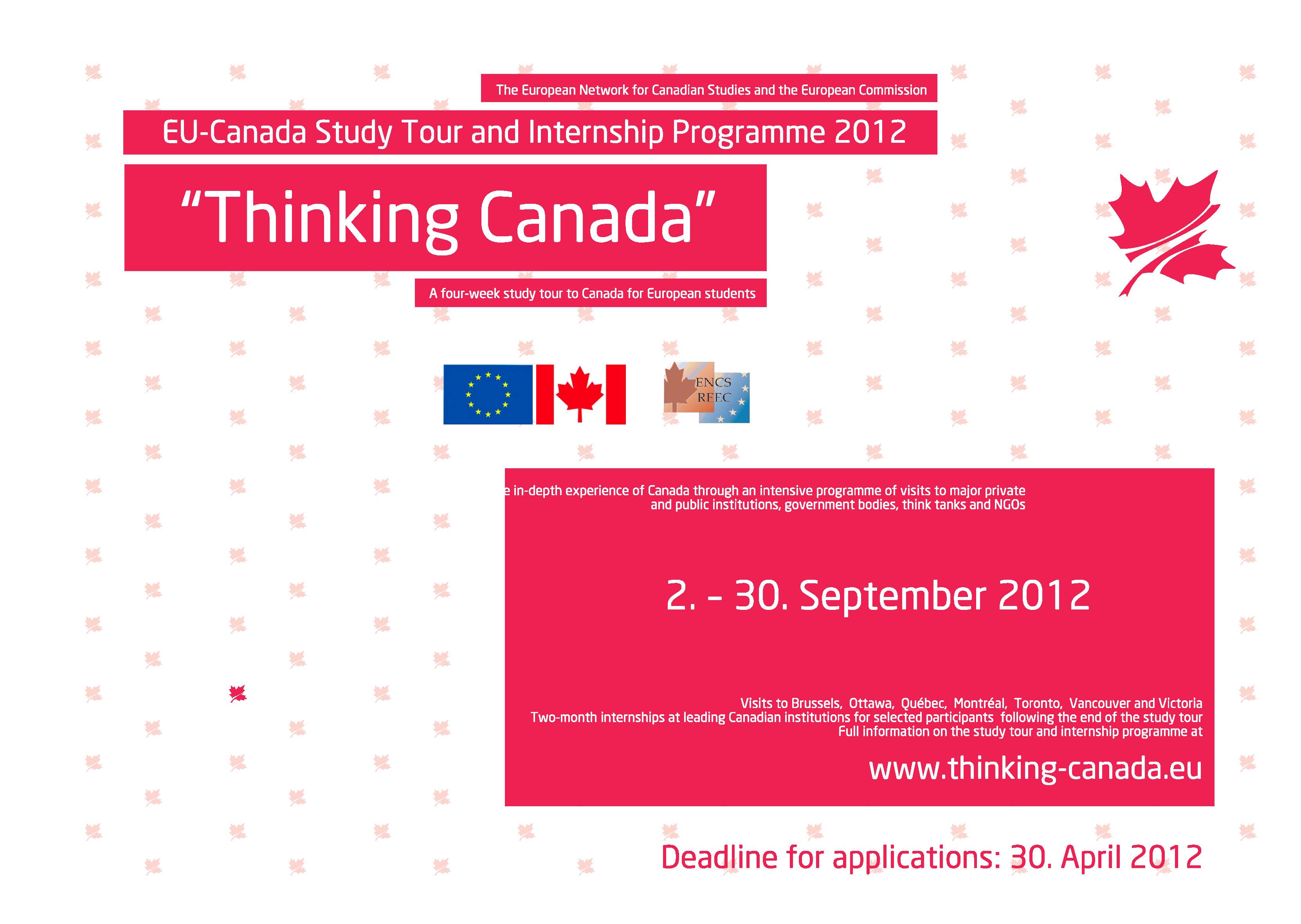EU-Canada Study Tour and Internship Programme 2011 –“Thinking Canada”
“Thinking Canada” 2011 – Strengthening EU-Canada Links

The EU-Canada Study Tour and Internship Programme “Thinking Canada” offers students from European Union Member States a unique in-depth experience of Canada and of EU-Canada relations. This is achieved through an intensive four-week programme that begins in Brussels at the European Institutions and then moves to Canada, with study visits in Ottawa, Québec, Montréal, Toronto, Vancouver and Victoria. Selected students remain in Canada to undertake internships in different institutions
“Thinking Canada” is a project of the European Network for Canadian Studies (ENCS), the umbrella group for all national and regional Canadian Studies associations in Europe. It was undertaken at the request of the European Commission, which also provides the bulk of the financial support. Both the first such initiative, “Thinking Canada 2010”, as well as this year’s “Thinking Canada 2011” had additional funding from the ENCS, its national/regional associations and the students themselves, and benefitted greatly from the very generous in-kind support of federal, provincial and local authorities as well as non-governmental institutions in Canada, as well as that of the European Union institutions. Furthermore, support this year was also provided by the Canada-Hungary Educational Foundation and several internship hosting institutions.
In response to wide publicity by the Canadian Studies associations and Canadian Embassies in Europe as well as European Commission Representations in the EU member states, 360 students applied for the programme, thirty-two of whom, from twenty-three Member States across the European Union, were selected to take part in the programme. The participants – 7 PhD students, 19 Master’s students, and the remainder senior level undergraduates – came from a wide variety of disciplines, ranging from economics, business and management and administration through political science, international relations, security and strategic studies, history, sociology and environmental studies to European Studies, North American and Canadian Studies, and the study of languages.
Building on the success of the study tour “Thinking Canada 2010”, the first of its kind, the organizers of the “Thinking Canada 2011” study tour created a highly demanding and attractive programme that provided its participants with the opportunity to receive briefings and exchange views with representatives of the institutions of the European Union as well as prominent figures from a wide range of public and private bodies in Canada. Twelve thematic areas were covered: the EU and EU-Canada relations; social diversity (bilingualism, multiculturalism); Aboriginal issues; Canadian culture and history (including visits to several museums); public policy and constitutional issues; monetary and financial topics; social issues; business, trade, industry and labour relations; fundamental rights and civil society; and the environment.
Briefings in Brussels covered the following main institutions: the European Parliament, European Council, European Commission, European Court of Justice, European Central Bank and the Canadian Mission to the European Union. In Canada the students were briefed byrepresentatives of a wide variety of institutions at all three levels of government (federal, provincial and municipal), major non-governmental organizations and agencies (among them the Bank of Canada), leading economic players such as HydroQuébec, labour representatives (Canadian Labour Congress), cultural institutions (Canadian Conference of the Arts), think tanks (the IRPP in Montréal, the Asia Pacific Foundation and Pembina Institute in Vancouver) and NGOs, as well as the European Commission Delegation to Canada and the EU Presidency (Poland), represented in Canada by the Polish Ambassador.
In the course of the study tour proper in Canada, the students visited around fifty institutions, with over eighty presentations followed by lively and at times provocative discussions. Altogether these amounted to 120 full hours of seminars and learning opportunities.
Following the study tour, nine participants remained in Canada to undertake two-month internships. These were offered by think tanks, NGOs, public bodies and EU-related institutions in Ottawa, Montréal, Toronto and Vancouver. The generous support of the Canada-Hungary Educational Foundation, the Polish Consulate General in Toronto and PORTAGE (Lac Echo, Québec) for three of the internships made it possible to increase the number of internships initially planned.
The EU-Canada tour was organized as a counterpart to the already existing European Union Study Tour and Internship Program, now in its ninth year, which offers an annual programme in the form of a study visit to the European Union for Canadian students. The programme in Europe served as a model in the planning of the European students’ programme in Canada. In fact the main organizers of this programme – the Network for European Studies (Canada), involving over a dozen universities across Canada – played a central role in the EU-Canada tour as well. Both study tours, conceived as complementary, received joint official endorsement from the European Union and Canadian authorities.
Full information on the “Thinking Canada 2011” study tour and internship programme can be found at its website (www.thinking-canada.eu). The Network for European Studies (Canada) website is at www.capilanou.ca/europa.
For the European Network for Canadian Studies
Serge Jaumain, Université libre de Bruxelles – ENCS Convenor
For the EU-Canada Study Tour and Internship Programme 2011 – “Thinking Canada”
Don Sparling, MasarykUniversity, Brno – Executive Director
Alexandre Berlin, Honorary Director, European Commission – Co-Director, Europe
Programme/Canada Liaison and Internship Programme
Ed Lavalle, CapilanoUniversity, North Vancouver, British Columbia – Co-Director,
Programme in Canada